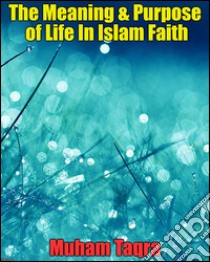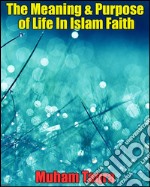The Meaning & Purpose of Life In Islam Faith. E-book. Formato Mobipocket - 9781516326778
di Muham Taqra
edito da MUHAM TAQRA , 2015
Formato: Mobipocket - Protezione: nessuna
The meaning of life, or the answer to the question "What is the meaning of life?", is a philosophical and spiritual conception of the significance of living or existence in general. The question seeking the meaning of life can also be expressed in different forms, such as "What should I do?", "Why are we here?", "What is life all about?", and "What is the purpose of existence?" or even "Does life exist at all?" There have been a large number of proposed answers to these questions from many different cultural and ideological backgrounds. The search for life's meaning has produced much philosophical, scientific, and theological speculation throughout history.
The meaning of life as we perceive it is derived from our philosophical and religious contemplation of, and scientific inquiries about existence, social ties, consciousness, and happiness. Many other issues are also involved, such as symbolic meaning, ontology, value, purpose, ethics, good and evil, free will, the existence of one or multiple gods, conceptions of God, the soul, and the afterlife. Scientific contributions focus primarily on describing related empirical facts about the universe, exploring the context and parameters concerning the 'how' of life. Science also studies and can provide recommendations for the pursuit of well-being and a related conception of morality. An alternative, humanistic approach poses the question "What is the meaning of my life?"
In Islam, man's ultimate life objective is to worship the creator Allah SWT (English: God) by abiding by the Divine guidelines revealed in the Qur'an and the Tradition of the Prophet. Earthly life is merely a test, determining one's afterlife, either in Jannah (Paradise) or in Jahannam (Hell).
For Allah's satisfaction, via the Qur'an, all Muslims must believe in God, his revelations, his angels, his messengers, and in the "Day of Judgment". The Qur'an describes the purpose of creation as follows: "Blessed be he in whose hand is the kingdom, he is powerful over all things, who created death and life that he might examine which of you is best in deeds, and he is the almighty, the forgiving" (Qur'an 67:1–2) and "And I (Allah) created not the jinn (demon) and mankind except that they should be obedient (to Allah)." (Qur'an 51:56). Obedience testifies to the oneness of God in his lordship, his names, and his attributes.
The Sufi view of the meaning of life stems from the hadith qudsi that states "I (God) was a Hidden Treasure and loved to be known. Therefore I created the Creation that I might be known." One possible interpretation of this view is that the meaning of life for an individual is to know the nature of God, and the purpose of all of creation is to reveal that nature, and to prove its value as the ultimate treasure, that is God....
The meaning of life as we perceive it is derived from our philosophical and religious contemplation of, and scientific inquiries about existence, social ties, consciousness, and happiness. Many other issues are also involved, such as symbolic meaning, ontology, value, purpose, ethics, good and evil, free will, the existence of one or multiple gods, conceptions of God, the soul, and the afterlife. Scientific contributions focus primarily on describing related empirical facts about the universe, exploring the context and parameters concerning the 'how' of life. Science also studies and can provide recommendations for the pursuit of well-being and a related conception of morality. An alternative, humanistic approach poses the question "What is the meaning of my life?"
In Islam, man's ultimate life objective is to worship the creator Allah SWT (English: God) by abiding by the Divine guidelines revealed in the Qur'an and the Tradition of the Prophet. Earthly life is merely a test, determining one's afterlife, either in Jannah (Paradise) or in Jahannam (Hell).
For Allah's satisfaction, via the Qur'an, all Muslims must believe in God, his revelations, his angels, his messengers, and in the "Day of Judgment". The Qur'an describes the purpose of creation as follows: "Blessed be he in whose hand is the kingdom, he is powerful over all things, who created death and life that he might examine which of you is best in deeds, and he is the almighty, the forgiving" (Qur'an 67:1–2) and "And I (Allah) created not the jinn (demon) and mankind except that they should be obedient (to Allah)." (Qur'an 51:56). Obedience testifies to the oneness of God in his lordship, his names, and his attributes.
The Sufi view of the meaning of life stems from the hadith qudsi that states "I (God) was a Hidden Treasure and loved to be known. Therefore I created the Creation that I might be known." One possible interpretation of this view is that the meaning of life for an individual is to know the nature of God, and the purpose of all of creation is to reveal that nature, and to prove its value as the ultimate treasure, that is God....
Ean
9781516326778
Titolo
The Meaning & Purpose of Life In Islam Faith. E-book. Formato Mobipocket
Autore
Editore
Data Pubblicazione
2015
Formato
Mobipocket
Protezione
nessuna
Punti Accumulabili





